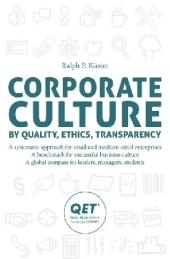 Neuerscheinungen 2015Stand: 2020-02-01 |
Schnellsuche
ISBN/Stichwort/Autor
|
Herderstraße 10
10625 Berlin
Tel.: 030 315 714 16
Fax 030 315 714 14
info@buchspektrum.de |

Ralph P. Küster
Corporate Culture
by quality, ethics, transparency
2015. 164 S. 190 mm
Verlag/Jahr: EPUBLI 2015
ISBN: 3-7375-7717-X (373757717X)
Neue ISBN: 978-3-7375-7717-5 (9783737577175)
Preis und Lieferzeit: Bitte klicken
Shaping up for the future
A company that uses quality, ethics and transparency as a benchmark for corporate behavior is infinitely more attractive to staff, customers and business partners alike.
QET code of practice: 60
guidelines for sustainable
business
Let´s move on to the 60 guidelines which will help fortify
your company for the future. These guidelines are divided
into three sections, each containing twenty units. They
address the three core elements of sustainable business:
quality, ethics and transparency. The quality of your products
and services must be spot-on. Your corporate actions
must be ethically sound, both clearly visible and transparent.
There is no room for hiding anything or fooling
anybody. Managing to follow these guidelines will confirm
you an honorable businessperson. Members of the
public, even the most critical ones, be unable to damage
you. And this in turn will enable your company to either
acquire or maintain an impeccable reputation. Your current
customers will remain loyal and new customers will
trust your integrity. Revenue will increase. And recruiting
highly educated, qualified employees who identify with
your company´s philosophy, will be effortless because your
growth is based on integrity - pure and simple. Make no
mistake, your company´s future success will absolutely depend
on it.
Küster, Ralph P.
Ralph Küster was born in North Rhine-Westphalia in 1965.He studied architecture at the Technical University of Nuremberg and became a successful planer and developer of commercial buildings. Son Christian was born in 1989, Rebecca joined the family in 1995. In 2005, he decided, along with 2 fellow entrepreneurs, to found the QET institute with the aim of developing standards for corporate behavior. After nearly two years of attending meetings in leading government circles, repeated visits to Bertelsmann, TÜV, Dekra, RAL, alongside many other institutions, the team decided in 2007 to develop a unique corporate culture management system geared towards small and medium-sized businesses. This laid the foundations for the QET licensing system. QET remains, to this day, 100% self-financed.


